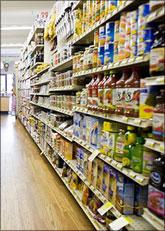If excise duties are revised upwards, it will affect the FMCG sector, which is witnessing sequential rise in its input costs.
 While there is widespread expectation that excise duty is likely to be raised on revenue considerations, the fast moving consumer goods (FMCG) sector pleads for retaining them at current levels to spur demand.
While there is widespread expectation that excise duty is likely to be raised on revenue considerations, the fast moving consumer goods (FMCG) sector pleads for retaining them at current levels to spur demand.
Current status
The FMCG sector continues to perform very well for FY09 despite fall in GDP number and poor performance by the other industries. India's GDP growth has been decelerating from 9.9% in FY06-07 to 9.05% in FY07-08, which has come down further to 6.7% in FY08-09.
But increase in domestic consumption and rural sector story helped FMCG companies to closed the year with good double digit growth.
Rural income and sentiments are on an uptick due to food price inflation, loan waiver, subsidies, employment generation schemes, satisfactory monsoon and better farm practices.
Food price inflation has, in fact, helped farmers, as they receive higher prices for food grains, while their input costs continue to be subsidized.
Several government initiatives related to loan waiving and employment generation are leaving households with good disposable incomes and upbeat sentiments.
In FY09, FMCG sector continued to grow by 17% to18% in volume terms. FMCG has inherent characteristics of necessity and inelastic products used for daily consumption.
But rise in commodity prices led by spike in oil prices impacted FMCG companies leading to dent in profitability for the first 9 months of FY09. But in second half of FY09, FMCG companies have shifted their emphasis on mass products in order to gain volume growth.
Also the demand from rural India, which constitutes around 50% of the total FMCG market in India is expected to remain strong, as it has been boosted by hikes in minimum support prices for agricultural commodities and form loan waivers.
As a result, strategies and marketing initiatives are now being focused on capturing rural market and increase rural penetration
Industry expectations
- Focus on rural sector through employment generation and infrastructure spending.
- To increase personal tax exemption limit above Rs 1.5 lakh (Rs 150,000).
- Want reduction on dividend distribution tax.
- Rationalizing the Value Added Tax (VAT) across the food processing industry.
- Expects tax holiday for food processing industry.
- Expects tax incentive for Research & Development in food processing industry.
- Reduction in VAT from 12.5% to 4% on biscuit, bread, bhujia, namkeen, jam, jellies and fruit juice
- Maintain the 2010 timeline for implementation of GST and replace the redundant and cumbersome multiple tax system
- Reclassification of tobacco products and address differential tax structure.
- Maintain current level of excise duty on cigarette.
Analysts'/market expectations
The analyst expects hike in excise duty in cigarette by 7% to 10%. There might be rise in tax incidence on alcohol beverages, i.e. excise and sales tax.
The government may revised the cut in excise duty from 14% to 8% which it took during the last two stimulus package due to upward trend in oil prices. The government may announce some package for the rural development, for rural employment and for farmers, which is good news for FMCG sector.
Stocks to watch
HUL, ITC, Dabur, Nestle, Colgate, Godrej Consumer Product.
Outlook
Cigarette companies like ITC and VST industries may suffer if the government further increases excise duty on it.
The cigarette industry has already suffered from increased in duty for non-filter cigarette thus reducing the price difference between filter and non-filter cigarette.
As regards other segments of FMCG sector, the cut in excise duty by 600 bps has helped the them to improve their profitability at the time of rise in raw material prices thus positively affecting the bottom line of the companies.
If excise duties are revised upwards, it will affect the FMCG sector, which is witnessing sequential rise in its input costs.
On the otherhand, if the excise duties are retained, and if the Budget lays greater thrust on rural development, then budget would turn positive for the FMCG sector.
Outlook: Positive












 © 2025
© 2025